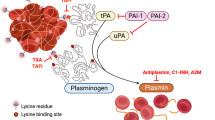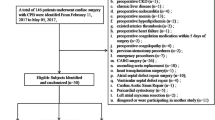Abstract
Objective: We evaluated the effect of tranexamic acid on blood loss in patients undergoing elective cardiopulmonary bypass for coronary artery bypass surgery.Methods: We randomly assigned 7 of 14 patients to a group receiving 50 mg/kg tranexamic acid before skin incision and after the start of cardiopulmonary bypass and the other 7 as controls.Results: Intraoperative and postoperative blood loss was significantly (p=0.025) reduced in the tranexamic acid group. A similar decrease in platelet count was observed during cardiopulmonary bypass in both groups. Antithrombin III was significantly (p=0.013) decreased in both groups during cardiopulmonary bypass. Antithrombin III and thrombin- antithrombin III complexes were signficantly (p=0.001) increased after protamine administration. A significant (p=0.010) decrease in α2-plasmin inhibitor was noted at 5 and 60 minutes after the start of cardiopulmonary bypass in the tranexamic acid group. α2-plasmin inhibitor-plasmin complexes were significantly (p=0.001) increased after the start of cardiopulmonary bypass in both groups and were significantly (p=0.012) decreased after protamine administration α2-plasmin inhibitor-plasmin complexes in the tranexamic acid group were significantly (p=0.030) lower than in controls 60 minutes after the start of cardiopulmonary bypass, just prior to the end of cardiopulmonary bypass, and after protamine administration.Conclusion: These findings showed that tranexamic acid administration effectively prevented perioperative blood loss without thromboembolic complications and that tranexamic acid during cardiopulmonary bypass coordinates the anticoagulative effect of heparin and the antifibrinolytic effect of tranexamic acid.
Similar content being viewed by others
References
Casas JI, Zuazu-Jausoro I, Mateo J, Oliver A, Litvan H, Muniz-Diaz E, et al. Aprotinin versus desmopressin for patients undergoing operations with cardiopulmonary bypass. J Thorac Cardiovasc Surg 1995; 110: 1107–17.
Bidstrup BP, Royston D, Sapsford RN, Taylor KM, Cosgrove III DM. Reduction in blood loss and blood use after cardiopulmonary bypass with high dose aprotinin (Trasylol). J Thorac Cardiovasc Surg 1989; 97: 364–72.
Alajmo F, Calamai G, Perna AM, Melissano G, Pretelli P, Palmarini MF, et al. High-dose aprotinin: hemostatic effects in open heart operations. Ann Thorac Surg 1989; 48: 536–9.
Royston D. Aprotinin prevents bleeding and has effects on platelets and fibrinolysis. J Cardiothorac Vasc Anesth 1991; 5: 18–23.
Gersbach Ph, Lammle B, Schupbach P, Muhlemann W, Althaus U. Major coagulation disorders when using aprotinin-observations on a case. Thorac Cardiovasc Surgeon 1991; 39:196–8.
Nakashima A, Matsuzaki K, Fukumura F, Hisahara M, Kanegae Y, Fukae K, et al. Tranexamic acid reduces blood loss after cardiopulmonary bypass. ASAIO Journ 1993; 39: M185–9.
Casati V, Guzzon D, Oppizzi M, Cossolono M, Torri G, Calori G, et al. Hemostatic effects of aprotinin, tranexamic acid, and ε-aminocaproic acid in primary cardiac surgery. Ann Thorac Surg 1999; 68: 2252–7.
Kawasuji M, Ueyama K, Sakakibara N, Tedoriya T, Matsunaga Y, Misaki T, et al. Effect of low-dose aprotinin on coagulation and fibrinolysis in cardiopulmonary bypass. Ann Thorac Surg 1993; 55: 1205–9.
Daily PO, Lamphere JA, Dembitsky WP, Adamson RM, Dans NF. Effect of prophylactic epsilon-aminocaproic acid on blood loss and transfusion requirements in patients undergoing first-time coronary artery bypass grafting. A randomized, prospective, double-blind study. J Thorac Cardiovasc Surg 1994; 108: 99–108.
Karski JM, Teasdale SJ, Norman PH, Carroll JA, Weisel RD, Glynn MFX. Prevention of postbypass bleeding with tranexamic acid and ε-aminocaproic acid. J Cardiothorac Vasc Anesth 1993; 7 (4): 431–5.
Horrow JC, Hlavacek J, Strong MD, Collier W, Brodsky I, Goldman SM, et al. Prophylactic tranexamic acid decreases bleeding after cardiac operations. J Thorac Cardiovasc Surg 1990; 99: 70–4.
Øvrum E, Holen EA, Abdelnoor M, Øystese R, Ringdal ML. Tranexamic acid (Cyklokapron) is not necessary to reduce blood loss after coronary artery bypass operations. J Thorac Cardiovasc Surg 1993; 105: 78–83.
Eriksson O, Kjellman H, Pibrant A, Schannong M. Pharmacokinetics of tranexamic acid after intravenous administration to normal volunteers. Europ J Clin Pharmacol 1974; 7: 375–80.
Soslau G, Horrow J, Brodsky I. The effect of tranexamic acid on platelet ADP during extracorporeal circulation. Am J Hematol 1991; 38: 113–9.
Vander Salm TJ, Ansell JE, Okike ON, Marsicano TH, Lew R, Stephenson WP, et al. The role of epsilonaminocaproic acid in reducing bleeding after cardiac operation: A double-blind randomized study. J Thorac Cardiovasc Surg, 1988; 95: 538–40.
Mammen EF, Koets MH, Washington BC, Wolk LW, Brown JM, Burdick M, et al. Hemostasis changes during cardiopulmonary bypass surgery. Semin Thromb Hemost 1985; 11: 281–92.
Harker LA, Malpass TW, Branson HE, Hessel II EA, Slichter SJ. Mechanisms of abnormal bleeding in patients undergoing cardiopulmonary bypass. Acquired transient platelet dysfunction associated with selective a-granule release. Blood 1980; 56: 824–34.
DelRossi AJ, Cernaianu AC, Botros S, Lemole GM, Moore R. Prophylactic treatment of postperfusion bleeding using EACA. Chest 1989; 96: 27–30.
Sterns LP, Lillehei CW. Effect of epsilon-aminocaproic acid upon blood loss following open-heart surgery: An analysis of 340 patients. Canad J Surg 1967; 10: 304–97.
Mannucci PM, Canciani MT, Tora L, Donovan BS. Response of factor VIII/von Willebrand factor to DDAVP in healthy subjects and patients with hemophilia A and von Willebrand's disease. Br J Haematol 1981; 47: 283–93.
Author information
Authors and Affiliations
Rights and permissions
About this article
Cite this article
Uozaki, Y., Watanabe, G., Kotou, K. et al. Effect of tranexamic acid on blood loss reduction after cardiopulmonary bypass. Jpn J Thorac Cardiovasc Surg 49, 273–278 (2001). https://doi.org/10.1007/BF02913132
Received:
Accepted:
Published:
Issue Date:
DOI: https://doi.org/10.1007/BF02913132




